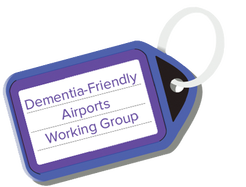Security screening consistently presents difficulties for air travelers living with dementia and their care partners/travel companions. The Dementia-Friendly Airports Working Group
(DFAWG) identified improving security screening as a focus point where we might be able to have a positive impact.
This summer, DFAWG solicited and received an invitation to develop a Best Practices document when engaging with travelers with Dementia in cooperation with Susan Buckland, a Senior Policy Advisor with the Transportation Security Administration’s Disability Branch of the Office of Civil Rights and Liberties, Ombudsmen and Traveler Engagement.
This Best Practices document would be shared through TSA internal communications as part of a National Shift Brief. The National Shift Briefs are documents developed by strategic communications and public affairs staff for distribution to all TSA officers at all airports. These documents are reviewed with all oncoming shifts of TSA staff.
Several members of DFAWG (Sara Barsel, Paula Biever, Amy House, Lori La Bey, Deb Nygaard) worked on this document. We received invaluable input from John-Richard Pagan, a gentleman living with Lewy Body Dementia. In addition to comments and edits on our draft, John-Richard submitted an essay “In the Words of an Individual Living with Dementia - What He Would Like You to Know.”
After some minor editing, we were notified that both the best practices document and John-Richard’s essay were distributed nationally to all TSA agents during the weeks of October 11 and October 18, 2020. Because of the length of the documents, they were distributed during two consecutive weeks in October, 2020. Effectively, this put the concerns of travelers living with dementia in front of TSA staff at all US airports for two weeks in a row!
These are the documents that were shared nationally with TSA agents:
Week of October 11-16, 2020
Week of October 18-23, 2020
The Dementia-Friendly Airports Working Group looks forward to continuing our relationship with the TSA to help promote safe and stress-free travel experiences for persons living with dementia and their care partners/travel companions.
(DFAWG) identified improving security screening as a focus point where we might be able to have a positive impact.
This summer, DFAWG solicited and received an invitation to develop a Best Practices document when engaging with travelers with Dementia in cooperation with Susan Buckland, a Senior Policy Advisor with the Transportation Security Administration’s Disability Branch of the Office of Civil Rights and Liberties, Ombudsmen and Traveler Engagement.
This Best Practices document would be shared through TSA internal communications as part of a National Shift Brief. The National Shift Briefs are documents developed by strategic communications and public affairs staff for distribution to all TSA officers at all airports. These documents are reviewed with all oncoming shifts of TSA staff.
Several members of DFAWG (Sara Barsel, Paula Biever, Amy House, Lori La Bey, Deb Nygaard) worked on this document. We received invaluable input from John-Richard Pagan, a gentleman living with Lewy Body Dementia. In addition to comments and edits on our draft, John-Richard submitted an essay “In the Words of an Individual Living with Dementia - What He Would Like You to Know.”
After some minor editing, we were notified that both the best practices document and John-Richard’s essay were distributed nationally to all TSA agents during the weeks of October 11 and October 18, 2020. Because of the length of the documents, they were distributed during two consecutive weeks in October, 2020. Effectively, this put the concerns of travelers living with dementia in front of TSA staff at all US airports for two weeks in a row!
These are the documents that were shared nationally with TSA agents:
Week of October 11-16, 2020
Week of October 18-23, 2020
The Dementia-Friendly Airports Working Group looks forward to continuing our relationship with the TSA to help promote safe and stress-free travel experiences for persons living with dementia and their care partners/travel companions.

